Ah, it's been quite a while since I wrote a real math article. I feel my fingers are out of practice...meh.
Today we'll be talking about the concept of using monsters as spells. After all, there actually is no distinction between the two cards in any sense whatsoever. Cards are cards whether they're on the field or in the hand. The idea that "spells" are different than "monsters" is simply something that the game determines as a way to differentiate how cards can be used according to the game state.
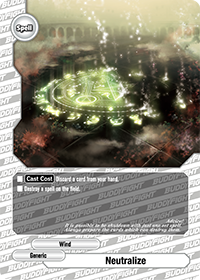 |
| A basic spell |
Spells are "cast" and do not remain on the field after their effects are done. Because of this, they are usually given powerful, wide-range, or advantage-gaining effects that make up for the loss in field presence that a monster usually gives. The baseline for spells is that they have to wash, absolutely. There is no use for a spell that will not wash, even if it's just for a specific (impactful) situation. Even washes are generally frowned upon because they actually don't give you anything outside of a resource conversion (it's essentially a waste of a card). In TCGs, resources are interchangeable but hand advantage is almost always preferred to anything else. This is a general statement but its a useful one to keep in mind.
Anyways, the reason why monsters don't need such good effects is because at the worst you can just call it to the center and protect yourself for a turn. And get an attack in. So monsters have more utility than spells by virtue of their card classification. It's generally better to be monster focused and use your spells to supplement and backup your monsters.
 |
| Spell-as-monster |
That's actually not what we're going to be discussing today. Since the difference between spells and monsters is actually meaningless, it's safe to say that you can interchange monsters for spells and vice versa - if their effects can overlap. For example, spells that deal damage can be treated as extra attacks, and spells that summon monsters can be treated as extra copies of said monster. This is relatively common in other games like Yugioh or Pokemon, though Buddyfight has yet to venture too far into this realm. I'm more interested in monsters that have such powerful effects that they can be played as spells while affording the basic utilities of monsters. In these cases, like I've touched in my Field Control article, you can actually play the monster as a spell and not even worry about getting an attack off. You don't lose anything whatsoever and in some cases you actually gain from being proactive with decision making. And all of this is afforded by a simple change of perspective.
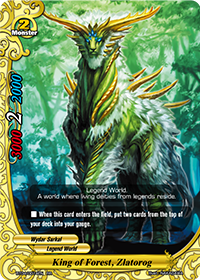 |
| King of Gauge |
We'll start with the most basic of monster-as-spell examples, the gauge ramp. There are several monsters that topgauge on-play, from the tricky Buer to the great Zlatorog. When you play these monsters on the field, even before you attack, the automatically make a very basic form of resource conversion: by playing them, you get gauge. That means that (before attack) they make the following trade: -1 card from hand, +X gauge. Of course, Death Wizard Dragon also requires another payment of -1 life. But you get the idea. What this means is that if you were hurting on gauge, you can call one of these monsters, get the gauge, then call over them at a minus and continue doing whatever cool combo you needed that extra gauge or two for. Usually you wouldn't do this but it's actually somewhat applicable for big plays and/or Final Turn, or if you have something like a Dragonic Grimoire and you don't care about minusing from hand.
You also want to play over the monsters you call becomes sometimes they really suck and you have better options. If they have some huge wall in the center and you call a Zlatarog, chances are you're not going to be doing much with that 2-crit or that 3000 power. I think it would be prudent to call Arthur over Zlatarog, be happy with your 2 gauge, and get some link attack Penetrate goodness in. You'll be making the most of your resources, which includes the amount and types of effective attacks.
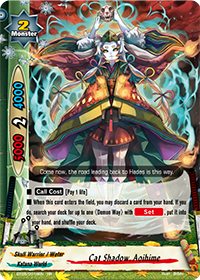 |
| Hata no Kokoro |
The next kind of monster-spell we'll discuss is tutoring ones. Like Mary Sue, Aoihime, and Gamigiri. These monsters search for other cards on-play and adds them to your hand. Mary Sue is a wash (2 gauge for 1 card) but both Aoihime and Gamigiri actually plus for the card you get - if you keep them on the field, that is. Most of these monster-as-spell effects are created this way, to be plusses only if you keep the said monster on the field for at least an attack or a block. For Aoihime and Gamigiri's case, the cards they search actually have synergy with themselves so it's not a big deal. But Mary Sue can search for literally anything. Sometimes, you just end up calling over her to make some crazy play with that spell. For example, Mary Sue into Deus Ex Machina is a total wipe for 4 gauge, at the cost of Mary Sue herself. But a better play would actually be Mary Sue into Grandfather Clock, then playing over Mary Sue to hit the 6 unique Wizards in drop requirement if you haven't already. Grandfather Clock is definitely a big play and is worth playing over Mary Sue for.
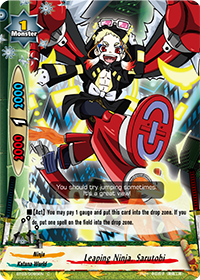 |
| Literally a spell |
Which brings me to a unique point in the idea of playing over monsters used as spells - you actually fuel your drop zone by doing this. Some decks use the drop zone as a resource, so this might indirectly benefit a few decks. Vassago, on play, cycles a card from your hand out. You can then play over Vassago to get another card into your drop zone, perhaps as a target for Devil Advantage or something (so you can do it again). There are definitely Worlds and archetypes that have drop zone requirements (Duel Dragons, Dragon Knights) so this is something to keep an eye out for. Playing Dragon Knight, Tomoe for the draw and then playing over her is not always a bad play.
There are many other monsters that can work as spells. Death Ruler, Gruen is a carbon copy of Sudden DEATH! in monster form. Agosbruch is even better because it pays 1 life instead of 1 gauge. Now that we've gotten to Ancient World, I have to admit that almost all their non-Size 3 monsters are literally monsters that are spells. Their difference is that they never hit the field to achieve their spell-like effects, whereas other cards have their spell-like effects as on-play effects like Iris. But they're actually the same, really. Compare Forbolka and Zlatarog - if you play over Zlatarog, it would be the same as discarding him from hand for the same 2 gauge that Forbolka gives.
Here is where this conversation takes off.
Judgement - The best spell in the game
Actor Knights Judgement. He is broken. Like no other card ever was. Let's look at his on-play effect and just how much advantage it accrues: it costs playing him (-1 from hand, but you get a monster so this is a wash) and 3 gauge (-1.5). Then, you draw 2 (+2), heal 3 (+1.5), and destroy 2 cards on the field (+2) for a total of +5.5 from a single card. 3 gauge for +5.5 is a freaking +4 in advantage. That's insane. If you could guarantee consistent Judgements all game, you'd win in a flash. Luckily, Judgement comes packed with so many restrictions that it's almost impossible to get him off consistently without a deck structured completely for him (a Tarot deck with tons of Destruction and Defense cards) which limits your other options, especially in terms of monster selection.
But he's so good, so damn freaking good that the two decks that make him work, DDW Tarots and Magic Tarots, are both incredibly powerful despite running somewhat abysmal spells and crappy monsters. Mathematically he cannot be denied. If you get him off even once, you've practically won the game. Which means that you can actually get 2/3 of his effects and still plus like a madman. Getting him in-play with all the requirements is difficult, but it truly is a good judgement of just how skilled of a player you are. I've been playing Tarots long before Judgement came out, so watching my S tier deck becomes SS+ tier was really satisfying.
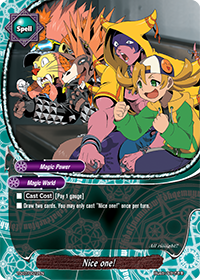 |
| Effect #1 |
There's an easy way to differentiate the good Tarot players from the legendary ones, and its completely from how they play Judgement. Good players play Judgement as a monster. Legendary players play Judgement as a spell.
When you play Judgement as a monster, you get that amazing +4 on-play do-every-good-thing-in-the-entire-game effect and a 6000/3/6000 monster on the field. You're probably calling that to the center, though you can call it to the right in DDW with a weapon in hand. Then, you attack with said 6000/3/6000 monster. Once. There are Size 0's in Generic Tarots but they're really expensive, you really don't have the gauge to waste for that. After your one attack, you end turn.
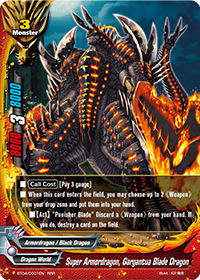 |
| Effect #2 |
When you play Judgement as a spell, you get the +4 but you're going to immediately call over Judgement so it's actually just a +3. As if that wasn't insane enough. You then can call any number of monsters from your hand and get attacks off from each of them. If you call one monster, you get one attack - that's the same as before, so you were better off sticking with Judgement's 6000/3 attack. If you call two monsters, you get two attacks - that's +1 better, but since you -1'd from calling over Judgement this is mathematically equivalent to sticking with Judgement. It is NOT, however, advantageously the same. 2 different attacks, even if they add up to the same critical, are far better than having a single attack of that crit value - it's harder to block and deal with for your opponent. In close situations, this is definitely a better play. If you call three monsters, you get three attacks - and now you're officially better off calling over Judgement to get extra attacks off. With the 2-crit Fool and the 3-crit Emperor as Size 1's in that deck, there's little reason NOT to call over Judgement from an offensive standpoint. Even defensively, High Priestess has 1000 more Defense.
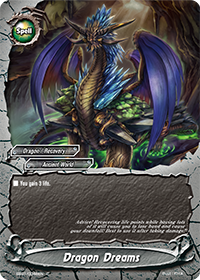 |
| Effect #3 |
The only reason you don't always call over Judgement is the fact that if you get his Destruction effect off, your opponent won't really have any field left for extra attacks to be truly effective. Needless to say, if you couldn't get the Destruction effect off and you have monsters in hand, you definitely should call over Judgement to guarantee that field clear.
Which brings me to the final point, and this is a reiteration of what I've stated long ago in Field Control: feel free to call over your monsters to get useful attacks. The best source of advantage in Buddyfight is an attack. Attacks are probably the closest thing to a draw-one in the game and always puts you one step closer to winning. An attack will always lead to either A. damage, B. field control, or C. a counter spell from your opponent's hand, which means that they lose a card for your attack. As a player, you should always aim for making the most of your attacks and getting as many meaningful, uncountered attacks you can get off. So even if it means calling over useless monsters or link attacking to breach a telegraphed Dragoenergy, make the most of your attacks.
In the end, treating monsters as spells is just a byproduct of optimizing attack potential.
All images used obtained from the official Bushiroad website and used here solely for reference purposes. Future Card Buddyfight!, logos, and respective content belong to Bushiroad. Large images belong to the Buddyfight! Wikia.











Very interesting article, for sure. Considering monsters and spells to be the same is a very unusual idea, but I believe you did a good job of getting your point across.
ReplyDeleteHowever, I do feel there was one point that warrants some mention, and that's the inherent risk associated with playing a monster as a spell.
Consider the Zlatarog example you gave, where you call a King of Forest (or some other topgauging card) solely for its effect, and then call something else on top of it for a net -1, or +0, if you count the 2 gauge as a card.
Now, the two gauge for one card is fairly standard in some cases, but there's actually an additional hidden condition for that gauge. That condition is the total size of your field after calling Zlatarog must not exceed 3.
If it does, you've technically just lost two or more cards for two gauge - Zlatarog himself (assuming you do call over him) and some other monster(s) to keep your field size low.
While this is a fairly obvious point, I do feel that it is a significant difference between monsters and spells. Using monsters in this way carries a bit more risk than regular spells. The main difference between the two, as I see it, is that spells can be cast regardless of field setup in most cases, whereas monsters have the innate condition of needing a proper field, simply by virtue of being monsters.
This may just be me being overly critical (and in fact, as I'm writing the comment, I feel like it may be somewhat rude) but I do feel that it should at least be mentioned at some point in the article, as it is a fairly important distinction between the two.
Overall, though, I really enjoyed the article. It gave an extremely interesting point of view, and I certainly look forward to reading the next one.
No, your point is a very justified one. However, there are certain things to consider:
Delete1. You should always assume that your opponent will prioritize important threats on your field before you. If they don't, then you're winning (and probably have no need to play Zlatarog, etc).
2. If your opponent left stuff on your field alive, it usually means that those things aren't a threat and you might as well play over them anyways. Either that or they're gunning for damage -> game in which case your response changes entirely.
In theory, there will be many cases where you can't freely call Zlatorog as a "spell" but in practicality these cases are actually very few.
And of course, I'm only presenting this perspective as a way to get people to look outside of the normal scope of this game and to be more inventive with plays and have a greater appreciation of how advantage works in the game.
I'm still not too sure that claiming that...
Delete"The idea that "spells" are different than "monsters" is simply something that the game determines as a way to differentiate how cards can be used according to the game state."
is something that is entirely accurate, and that shouldn't be scrutinized.
With regards to the two points you brought up, there is a very real chance that your opponent was simply unable to prioritize your threats, or that they could get something better from their attack by attacking you directly, instead. (Bear in mind, "something better" doesn't always have to be winning the game)
In the spirit of taking the Zlatarog/Legend World example as far as physically possible, a very general example of them being unable to deal with the threat would be an Armored Dragon, Cuelebre (5k defense and Soulguard) against a deck that tends to have low attack monsters (a la Magic World, certain Katana World decks, Dungeon World Adventurers, Generic, etc) and may have trouble killing him twice in a single turn.
In the event that you are able to maintain a strong field, even through your opponents turn, calling monsters and spells the same thing may be a bit of an overstatement.
Although you certainly could, in some cases, simply allow an easily-blockable attack that would destroy a potential threat on your field, just for the ability to get Zlatarog's two gauge for cheaper, I feel that these sorts of situations are actually fewer in number than, and oftentimes an inferior play to, simply blocking the attack.
I suppose what I'm trying to say is, your first point was that you should assume that your opponent will always prioritize the threats on your field. I certainly don't disagree with that.
However, by that same logic, if your opponent attacks a monster instead of you, that monster is likely either a threat to them, or getting in the way of them dealing direct damage.
In either case, you would likely want to protect those monsters, and rightfully so. Protecting a card of your own that has the potential to hurt your opponent is rarely a bad play, and the same could be said about guarding your center from attacks to prevent damage.
So, in other words, playing monsters as spells is fine, assuming your field is gone, i.e., you were unable to protect it last turn, or chose not to.
Before, I also mentioned something about your opponent being able to "get something better by attacking you." What I had in mind when writing that were cards like Magician of Glass, Will Glassart, or Electro Ninja, Electric Teru.
I feel that any case where your opponent doesn't prioritize the destruction of your field (which is not always a misplay) would be a case where playing monsters as spells would carry the risks mentioned before.
And just because I feel it needs mention again, I'm really not trying to be rude, or pretend I'm Mr Know-everything-about-Buddyfight. I'm just a bit concerned about the idea that monsters and spells should be treated the same in the majority of cases.
Hmmm...
DeleteFirstly, and this is somewhat irrelevant, but try to refrain from posting short essays in comments. It makes it easier to understand your main points.
Secondly, I feel that neither of us is incorrect in our own claims, but that our claims are simply not overlapping. I'm not arguing that monsters -are- spells, but rather that they can be treated or viewed as spells in light of card advantage, resource conversions, and field efficiency. It honestly doesn't matter if they can't be -used- as "spells" all the time, but rather that they -can- be used as spells. Field size and call restrictions are pretty irrelevant - after all, spells have their own slew of restrictions as well (once per turn, etc).
I completely understand where you're coming from, but I'm pretty sure the conversation regarding field as a restriction is either too obvious or actually irrelevant for the discussion. The goal in the first place was not to equate them, but to compare them.
Sorry about the "short essay" thing... I just wrote a lot to make sure I didn't leave anything I wanted to say out. I'll try and keep replies shorter from now on.
DeleteIf the purpose of the article was to simply compare monsters and spells, than I can understand your point. But from what I can tell, the article tries to more or less say they're the same. Mostly, the first paragraph, which states "Today we'll be talking about the concept of using monsters as spells. After all, there actually is no distinction between the two cards in any sense whatsoever."
But from a "comparing monsters to spells" standpoint, I feel that my point of the size restriction at least deserving some mention still stands., I noticed from your Card Advantage article that you compared Dragonic Heal to Invigorating Breath, saying Invigorating Breath was balanced due to the requirements. I feel that a similar situation has presented itself here, with two cards doing similar things with different requirements. All I'm trying to say is, I believe it's important to point out these restrictions and risks of monsters vs spells, especially in an article about comparing monsters to spells.
Dang... Shorter replies make me sound like even more of a jerk, so I'm sorry about that, but...
That's just you. I think you presented your point more clearly this time, and I read your intent a lot more clearly (so I know you're not trying to be mean!)
DeleteI'll see what I can do in terms of updates. As a writer, it's important that I present all the relevant information but also that I present them in a way that doesn't sound like I'm stating the obvious or being patronizing. There might be a way to present size issues without doing either, but it probably needs some well-thought out examples that I'll take the time to craft.
you could also consider some spells as monsters. An example of which is armour reuse or more of a fetch green dragon shield. As you do convert green dragon shield into a monster when you use it to protect your monsters.
DeleteHow does MW Judgement get stuff to the drop? Certainly it's not something as simple as just using Key of Solomon v1 and using that gauge for other effects, right?
ReplyDeleteSurprisingly, yes. Judgement in MW is simply a late-game guarantee and a good heal option. You charge what you want to ditch and pay it out. Since Defense is just Fortune/Solomon Shields they go in pretty easily as well. You usually don't get Destruction effects off, they're kinda a bonus.
Delete